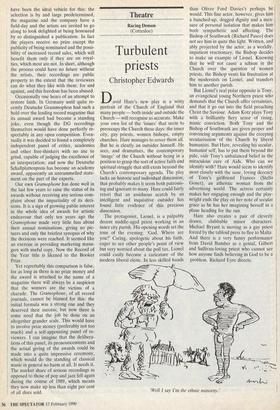Theatre
Racing Demon (Cottesloe)
Turbulent priests
Christopher Edwards
David Hare's new play is a witty portrait of the Church of England that many people — both inside and outside the Church — will recognise as accurate. Make your own list of the 'issues' that seem to preoccupy the Church these days: the inner city, gay priests, women bishops, empty churches. Hare manages to cover them all. But he is clearly an outsider himself. He sees, and dramatises, the contemporary 'image' of the Church without being in a position to grasp the sort of active faith and spiritual struggle that still exists beyond the Church's contemporary agenda. The play lacks an historic and individual dimension, that probably makes it seem both patronis- ing and ignorant to many. Hare could fairly retort that an assiduous search by an intelligent and inquisitive outsider has found little evidence of this precious dimension.
The protagonist, Lionel, is a palpably decent middle-aged priest working in an inner city parish. His opening words set the tone of the evening: 'God. Where are you?' Caring, apologetic about his faith, eager to see other people's point of view but very worried about the poll tax, Lionel could easily become a caricature of the modern liberal cleric. In less skilled hands than Oliver Ford Davies's perhaps he would. This fine actor, however, gives him a bunched-up, dogged dignity and a mea- sure of personal isolation that makes him both sympathetic and affecting. The Bishop of Southwark (Richard Pasco) does not see him in quite this light. Written, and ably projected by the actor, as a worldly, impatient reactionary, the Bishop decides tä make an example of Lionel. Knowing that he will not cause a schism in the Church over the question of women priests, the Bishop vents his frustration at the modernists on Lionel, and transfers him to another parish.
But Lionel's real polar opposite is Tony, an evangelical young Northern priest who demands that the Church offer certainties, and that it go out into the field preaching Christ the Saviour. Adam Kotz plays Tony with a brilliantly fiery sense of rising, manic conviction. Both Tony and the Bishop of Southwark are given proper and convincing arguments against the creeping secularisation of the Church by liberal humanists. But Hare, revealing his secular, humanist self, has to put their] beyond the pale, vide Tony's unbalanced belief in the miraculous cure of Aids. Who can we identify with? Hare would seem to identify most closely with the sane, loving decency of Tony's girlfriend Frances (Stella Gonet), an atheistic woman from the advertising world. The actress certainly makes her engaging enough and the play- wright ends the play on her note of secular grace as he has her imagining herself in a plane heading for the sun.
Hare also creates a pair of cleverly drawn, clubbable minor. characters. Michael Bryant is moving as a gay priest forced by the tabloid press to flee to Malta. And there is a very funny performance from David Bamber as a genial, Gilbert and Sullivan-loving priest who cannot see how anyone finds believing in God to be. a problem. Richard Eyre directs.
'Well I say I'm the ethnic minority.'


















































 Previous page
Previous page